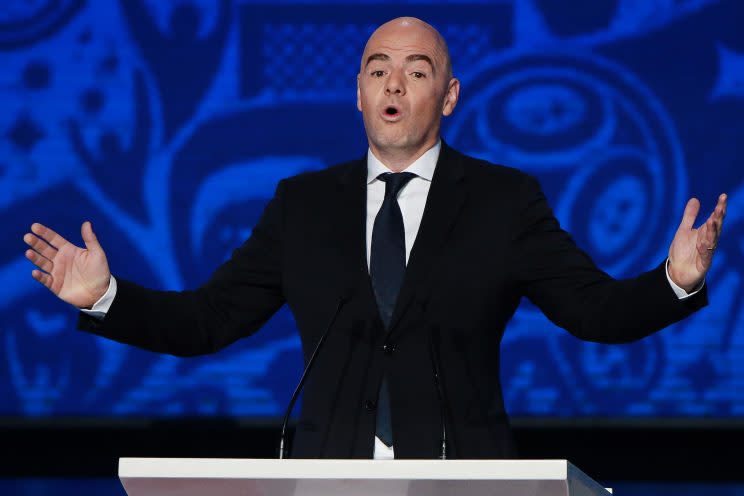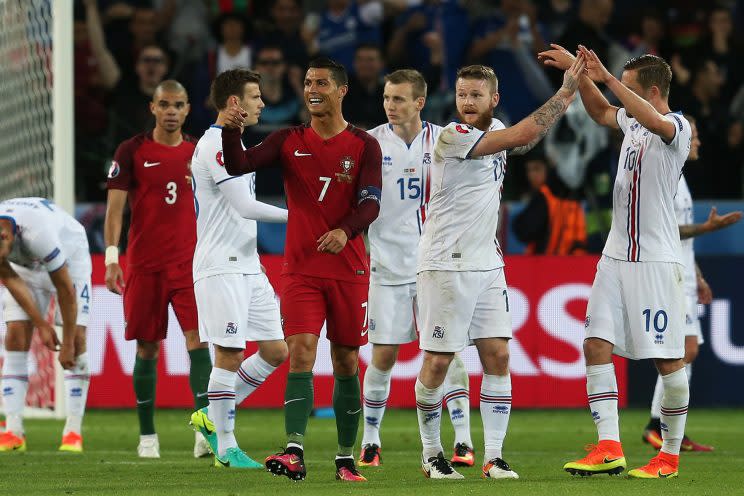World Cup expansion is a disaster for the fans and proof FIFA hasn't changed
Long before the votes were cast on Tuesday, FIFA president Gianni Infantino’s plan to expand the World Cup from 32 to 48 teams had become an inevitability. It would have been foolish to expect anything else. Here was an opportunity for FIFA to line their pockets and Infantino to consolidate his power, all with the bonus of easily disguising the proposal as a chance to promote fairness and equal opportunity. The 36 council members, told recently by Infantino that “the money of Fifa is your money”, voted unanimously.
Derision has been pouring in all day, most notably from the European Club Association (ECA), who have condemned a “political rather than sporting decision”. Others have been less reserved in their tone. New Fifa Now have said it will make a “mockery” of qualification and have predicted a less enjoyable end result for the fans.
[FIVE THINGS … THAT WILL BE GREAT ABOUT A 48-TEAM WORLD CUP]
It is very difficult to disagree with either of these organisations; FIFA has once again proved that their personal wealth has priority over fandom, and that its fundamental principles are still money and power. For anyone still clinging to the illusion that Sepp Blatter’s resignation would signal a change in direction – an end to the greed and self-interest that have plagued FIFA since its inception – today’s news should serve as final proof that nothing has changed.
The move is indeed political. Promising more money to council members is an obvious vote winner for Infantino, and expanding the size of the World Cup is the easiest way of creating more wealth. But the commercialisation of the sport comes at a heavy, heavy cost to the fans – the only people who really matter.

How World Cup 2026 will look – drab and largely without value
The new format sees the addition of an extra round sandwiched between a rejigged group stage and the last-16 tie. 16 groups of three will now compete in the first round, with two thirds of each group qualifying for the round of 32.
The problems with this new format are many. Not unlike the soul-destroying tedium of Euro 2016 – where the inflated competition lowered the risk of first-round elimination – this is likely to create a horribly stale first week or so. Put frankly, there are not 48 nations in the world worthy of playing at this level, and so each group of three will almost certainly include a minor nation easily thrashed by their opponents. The result, of course, will be 32 matches with virtually no meaning whatsoever.
What’s more, the small nations will inevitably play to frustrate, employing ultra-defensive football that creates lifeless and one-sided matches. Get ready for a group stage comprised entirely of attack-v-defence with an inevitable victor, and conservative draws between bigger nations who have nothing at stake. Of course, this lack of pressure could mean we see expansive, end-to-end matches in the group stages or even provide the likes of England with an opportunity to build something cohesive, but far more likely the World Cup 2026 will resemble a series of warm-up matches before the real thing kicks off with a knock-out round.

Sport without fun is nothing
The boredom this is likely to create has profound consequences for the sport as a whole. The football industry exists solely because it attracts spectators, and while our adoration has been successfully exploited for economic gain so far (it would not be profitable to expand the competition unless more people are expected to consume the matches) the limit of our interest is surely approaching.
The World Cup, like the European Championships, is slowly killing itself. Continually exploiting fandom for profit (and all profit, at its core, comes directly from spectator interest) is creating a less watchable product, and at some point, this bubble will burst. If World Cup 2026 proves boring, the public will not hesitate to switch off, and when this happens the entire house of cards could collapse.
Not that schadenfreude will repair the pain of losing the World Cup as we know it. And this is what is at stake here; without the richness of competition, the lurking threat of elimination, and the excitement that comes with knowing this is the best of the best in world football, the competition will not feel meaningful.
Diluting competitiveness drains the life from football
Competitiveness is an important point here, as raised by New Fifa Now, who argue that this “money grab and power grab” will make the World Cup less competitive and less enjoyable, and despite Infantino’s assertions it “will not help development of the game or provide improved competitive opportunities for lower-ranked nations”.
They are right. The qualification process will suffer considerably, and the smaller countries – though no doubt enjoying their time at the tournament – will be eliminated every time after a measly two matches. It does not increase their status, but instead diminishes that of the competition. There is very little reason to assume any of these countries will benefit at grassroots level, and given all of the downsides the thrill of one week at the World Cup is not a strong enough reason to approve expansion.
Football exists in a tension between art and war, its rivalry and artistry essential to one another, its beauty deriving from the physical art required to outwit an opponent; the pursuit of increasing qualification in the name of fairness distorts both qualities. But then again, we all know that this is not the real reason why Fifa has voted to diminish its own competition.
The World Cup is set to become a tedious and low-quality affair resembling the blandness of Euro 2016, that most forgettable of tournaments. For now, this means bigger profits for the fat cats at the top; their own research predicts that an expanded format will see their profit rise by £521m. But with time they will realise that their greed comes at a heavy price.


